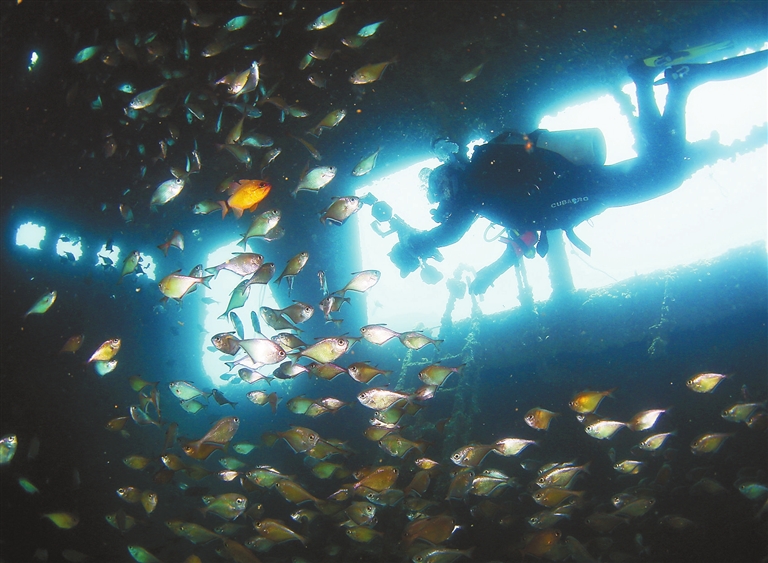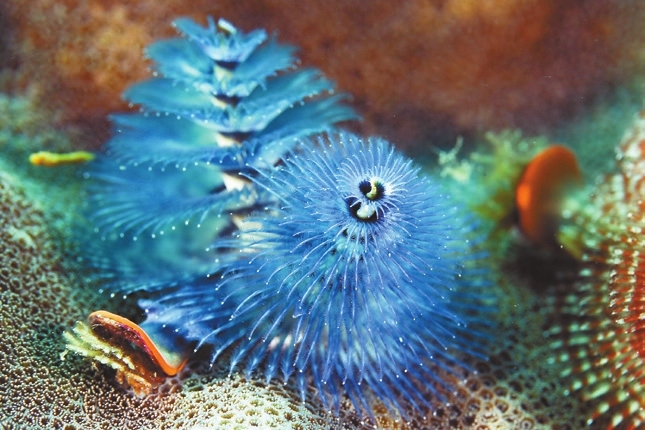

WHEN Wang Aimin, then a professor of oceanic science at Hainan University, started helping with marine ranching by dropping artificial reefs into seawater in 2011, he was ridiculed by local divers. Wuzhizhou Island is a popular tourist destination in Sanya City, South China’s Hainan Province. Recalling their jibes, Wang said the divers would ask him: “Are you trying to blow up some seawater for a show, Mr. professor?” Now, more than a decade later, Wang’s efforts have paid off. By placing artificial reefs and transplanting corals underwater, he and his team helped restore the marine ecology in the waters off Wuzhizhou Island. Hundreds of marine species thrive in the marine ranch near the island, according to latest government data. It is China’s first tropical marine ranch. Marine ranching involves placing artificial reefs, including cement frames and old iron boats, at fixed sites under seawater, which can attract fish, shrimps, crabs, shellfish and other marine life to forage, rest and reproduce. The butterfly-shaped Wuzhizhou Island is located in Sanya’s Haitang Bay and is surrounded by clean water offering stunning scenery. A national-level tourist attraction, the island has always been known as a cash cow for the local tourism industry. “There were many different varieties of fish here in the early days,” said Ding Feng, who works at the tourist site. “Since the scenic spot opened to the public in 2000, we have had countless visitors.” However, long-term overfishing degraded the eco-environment, and the fish population decreased considerably in the subsequent years. “We were looking for ways to help restore the marine environment, and around 2010, the agricultural authorities suggested the idea of marine ranching,” Ding said, adding that the tourist attraction started to invite experts and find investment to launch the marine ranching project. But building a ranch beneath the water surface was a hard nut to crack for many experts, including Wang. “I had limited knowledge about marine ranching in the beginning,” he said. After preparations, Wang, with his team, started the project in 2011. The team designed 200 round and triangular-shaped concrete reefs. The reefs were then loaded onto ships at dock and unloaded at several fixed sites in the sea. “The divers nearby who saw us throwing the concrete objects into the water would laugh at us,” Wang said. “Even I was not sure if the project could work out as expected.” To support the initiative, provincial and city authorities allocated up to 10 million yuan (US$1.5 million) to help place artificial reefs and old boats beneath the sea, upon which seaweed and corals began to grow. In addition to regular reefs, under the guidance of Wang, students from Hainan University also designed “sightseeing reefs” and other sculptures to be placed under seawater. Such efforts not only helped improve the environment but also beautified the seafloor, creating images of “underwater villages” and “underwater museums,” which have in turn drawn many diving enthusiasts. In 2019, the marine ranch near Wuzhizhou received approval for inclusion on the fifth batch of national-level demonstration marine ranches. Thanks to years of relentless efforts, the fish population in the waters near Wuzhizhou Island has increased by up to 10 times compared with 2011, and more than 120 corals are thriving in the area. In recent years, the number of divers totaled 380,000 and diving activities are regulated under strict rules. Visitors are not allowed to step on the corals or the reefs, but they are encouraged to plant corals while diving. “Marine ranching certainly helped restore the biodiversity,” said Chen Jingyuan, a local official. Earlier this month, Wang Aimin retired, but he plans to continue his marine ranching efforts. “I hope that the experience we have gained here in Wuzhizhou Island will set a good example for similar projects in other parts of the country,” Wang said. (Xinhua) | 
